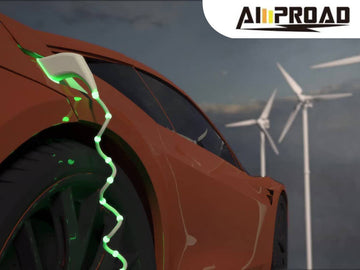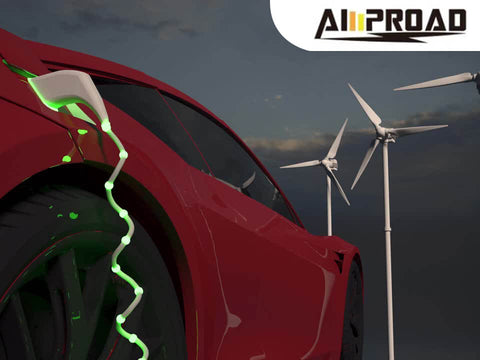
As electric vehicles (EVs) continue to gain popularity, the demand for convenient and flexible charging solutions has risen. One such solution is a mobile EV charger, a portable and versatile device designed to provide on-the-go charging capabilities for EV owners.
What Is a Mobile EV Charger?
Owning an electric vehicle (EV) is an environmentally-friendly choice, but ensuring you have adequate charging options can be a challenge, especially when you're on the go. This is where mobile EV chargers come into play, offering a convenient solution for EV owners who need to juice up their rides while away from home.
Definition and purpose of a mobile EV charger
A mobile EV charger is a portable device designed to provide electric vehicle owners with the ability to charge their vehicles' batteries while on the move. These compact and versatile units allow you to replenish your EV's battery by connecting to various power sources, ensuring you're never stranded due to a depleted battery.
Different types of mobile EV chargers available for EV owners
Mobile EV chargers come in different varieties, catering to various charging needs and preferences. Some are Level 1 chargers, which use standard household outlets for a slower but convenient charging option. the other is Level 2 charger, which offers faster charging speeds by tapping into higher-voltage power sources, such as dedicated EV charging stations or specialized outlets.
How Does a Mobile EV Charger Work?
Overview of the charging process with a mobile EV charger
Mobile EV chargers are designed to convert the available electrical power from a power source into the appropriate voltage and current required to charge an EV's battery. The charging process typically involves connecting the charger to a power source, such as a wall outlet or a dedicated EV charging station, and then plugging the charger into your vehicle's charging port. Once connected, the charger will begin transferring electricity to your EV's battery, replenishing its charge.
Compatibility with different EV models and charging standards
One of the key features of mobile EV chargers is their compatibility with various EV models and charging standards. Manufacturers ensure that their chargers can work seamlessly with a wide range of electric vehicles, accounting for different charging port designs and battery management systems. This compatibility allows EV owners to use a single mobile charger for multiple vehicles, making it a versatile investment.
The myriad benefits of using a portable EV charger are hard to ignore. For starters, these nifty devices offer unparalleled convenience by enabling you to charge your electric vehicle at various locations, freeing you from the constraints of fixed charging stations. This flexibility is especially advantageous for those who may not have access to dedicated charging infrastructure at home or work.
Moreover, portable EV chargers can serve as invaluable emergency backups in case of unexpected battery depletion, ensuring that you're never stranded without a means to recharge your vehicle. Whether you're on a road trip, attending an event, or simply running errands, a portable charger can provide the peace of mind that comes with knowing you can top up your EV's battery whenever necessary.
Benefits of Using a Mobile EV Charger

Embracing the convenience of mobile EV charging can revolutionize the way you approach electric vehicle ownership. These innovative solutions not only provide a hassle-free charging experience but also offer invaluable peace of mind, ensuring you're never stranded with a drained battery.
Convenience and flexibility of charging on the go
One of the primary advantages of using a mobile EV charger is the unparalleled convenience and flexibility it offers. With a portable charging solution, you're no longer tethered to fixed charging stations or limited by the constraints of your home charging setup. Whether you're on a road trip, attending an event, or simply running errands, a mobile charger empowers you to top up your EV's battery wherever you go, eliminating range anxiety and maximizing your vehicle's usability.
Emergency charging solution for unexpected situations
Unexpected situations can arise, and a mobile EV charger serves as an invaluable emergency backup. Perhaps you miscalculated your battery's range, or you encountered unexpected traffic or detours that drained your EV's charge faster than anticipated. With a mobile charger in your trunk or backseat, you can easily connect to a power source and replenish your battery, ensuring you never find yourself stranded due to a depleted battery.
Types of Mobile EV Chargers
Portable EV chargers for on-the-go charging
Portable EV chargers are designed with ultimate portability in mind, making them the ideal choice for on-the-go charging. These compact and lightweight units can easily be stowed in your vehicle's trunk or backseat, ready to be deployed whenever you need to top up your battery. Portable chargers typically connect to standard household outlets, providing a convenient charging solution wherever you can find a power source.
Level 2 EV chargers for faster charging at home or public stations
While portable chargers offer convenience, EVSE Level 2 EV chargers provide a more powerful and efficient charging experience. These hardwired or plug-in units are designed to deliver faster charging speeds by tapping into higher-voltage power sources, such as dedicated EV charging stations or specialized outlets. Level 2 chargers are often installed at homes or public charging locations, offering a quicker and more efficient way to replenish your EV's battery when you have access to the appropriate infrastructure.
Investing in a mobile EV charger offers the flexibility to charge your electric vehicle wherever you are. Amproad's Level 1 and Level 2 dual-use portable EV charger provides a versatile solution for both emergency roadside assistance and convenient home charging. With its compact design and dual voltage compatibility, Amproad's charger ensures that you can charge your EV safely and efficiently whether you're on the road or at home. Its intuitive features make it easy to use, while its robust construction guarantees durability and reliability, giving you peace of mind on every journey.
Considerations When Choosing a Mobile EV Charger
Investing in a mobile EV charger can be a game-changer for electric vehicle owners, but it's crucial to make an informed decision to ensure you get the most out of your purchase. With a variety of options available, considering factors like charging speed, compatibility, and portability can help you select the perfect charger for your needs.
Charging speed and compatibility with your EV model
One of the most important considerations when selecting a mobile EV charger is the charging speed it offers and its compatibility with your specific electric vehicle model. Some chargers provide faster charging rates, while others prioritize portability over speed. It's essential to choose a charger that aligns with your charging needs and is compatible with your EV's charging port and battery management system to ensure a seamless and efficient charging experience.
Portability, durability, and additional features
Portability is a key factor when it comes to mobile EV chargers, as you'll want a unit that is compact and lightweight enough to transport easily. However, portability shouldn't come at the cost of durability. Look for chargers with rugged designs and sturdy casings that can withstand the rigors of travel and outdoor use. Additionally, consider any additional features that may be useful, such as built-in cable management systems, temperature monitoring, or app connectivity for remote monitoring and control.
How to Use a Mobile EV Charger Safely
Following manufacturer instructions and safety guidelines
Using a mobile EV charger safely is paramount to ensuring a positive charging experience and protecting yourself and your vehicle. Always carefully read and follow the manufacturer's instructions and safety guidelines for your specific charger. These guidelines will cover important aspects such as proper setup, connection procedures, and any precautions or warnings you should be aware of.
Proper cable management and electrical safety precautions
Proper cable management is essential when using a mobile EV charger to prevent tripping hazards and potential damage to the cables or charging equipment. Always ensure that cables are neatly arranged and secured, and avoid running them across high-traffic areas or in a way that could cause them to become pinched or damaged. Additionally, always exercise electrical safety precautions, such as ensuring that the power source you're using is compatible with the charger's voltage and amperage requirements and that all connections are secure and free from any visible damage.
Embracing mobile EV charging can significantly enhance your electric vehicle ownership experience, providing unparalleled convenience, flexibility, and peace of mind. With the right mobile charger by your side, you can conquer range anxiety and enjoy the freedom of electric driving without the constraints of fixed charging stations.
Remember, taking the time to carefully consider factors like charging speed, compatibility, portability, and durability will ensure you make the most informed decision when selecting your mobile EV charger. And once you've chosen your perfect charging companion, always prioritize safety by following manufacturer guidelines, practicing proper cable management, and adhering to electrical safety precautions.
FAQs
What is the difference between a portable EV charger and a Level 2 EV charger?
The main difference between a portable EV charger and a Level 2 EV charger lies in their charging capabilities and installation requirements. Portable EV chargers, such as the Amproad max 40A portable EV charger, are smaller, more lightweight, and designed for easy transport. They allow users to charge their electric vehicles using a standard wall outlet, providing convenience and flexibility for on-the-go charging.
In contrast, Level 2 EV chargers require a dedicated 240-volt electrical circuit and are typically installed at home or in public charging stations. These chargers offer faster charging speeds compared to portable chargers, making them ideal for overnight or extended charging sessions. However, it's worth noting that some portable EV chargers, like the Amproad max 40A portable EV charger, are capable of delivering Level 2 charging speeds. This means they can provide faster charging rates, similar to Level 2 chargers, while still offering the portability and convenience of a portable charger.
How long does it take to charge an electric vehicle using a mobile EV charger?
The charging time for an electric vehicle using a mobile EV charger can vary depending on factors such as the vehicle's battery size, the charging capacity of the charger, and the current battery level. Generally, mobile EV chargers provide slower charging speeds compared to Level 2 chargers, typically delivering around 3 to 5 miles of range per hour of charging. Therefore, it may take several hours to fully charge an electric vehicle using a mobile EV charger.
Can I use a mobile EV charger to charge my electric vehicle while driving?
No, it is not recommended to use a mobile EV charger to charge your electric vehicle while driving. Mobile EV chargers are designed for stationary use and require a stable power source, such as a wall outlet or charging station, to operate safely and effectively. Attempting to charge your electric vehicle while driving can pose significant safety risks and may damage the charger or the vehicle's electrical system.
What safety precautions should I take when using a mobile EV charger?
When using a mobile EV charger, it is important to follow safety precautions to prevent accidents and ensure the charger's proper functioning. Some safety tips to consider include:
- Use only the manufacturer-approved charging cables and adapters.
- Inspect the charger and cables for any signs of damage before use.
- Ensure that the power source meets the charger's voltage and amperage requirements.
- Avoid charging in wet or damp conditions to prevent electric shock.
- Do not overload electrical outlets or extension cords when charging.
- Disconnect the charger from the power source and the vehicle when not in use.
- If charging outdoors, use a weatherproof cover or enclosure to protect the charger from the elements.



